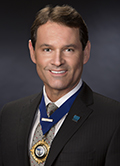- Securing Your Future Through Advocacy
- Saturday, 1-1:50 p.m.
- Hyatt Regency Chicago Grand Ballroom cd
Anesthesiologists who are not active politically are risking their own futures — and the futures of other anesthesiologists. Advocacy is the only way to secure the future.

2017 ASA President Jeffrey Plagenhoef, M.D., will address attendees during this special session.
“Advocacy is highly relevant, particularly for residents,” said Daniel Hansen, M.D., President of the ASA Resident Component and a resident physician at Mayo Clinic Arizona. “The dynamic nature of the health care landscape makes it critical that we get involved now so we know what is coming over the years of our careers. None of us can afford to sit back and be passive participants in our own future.”
Dr. Hansen will moderate a special session, “Securing Your Future Through Advocacy,” which is part of the Resident and Fellows program, where advocacy is a hot topic. Anesthesiologists have a clear choice, he said. They can either be part of the discussions that shape the future of health care or they can be victims of those discussions.
“It is critical to recognize the importance of being involved and of taking an active role in the political processes,” he said. “Advocacy has become of paramount importance as political processes have accelerated in the ways they are impacting health care. You have to make it your priority to be involved and to integrate that involvement into what we envision as our role as residents and as anesthesiologists.”
One of the most direct routes to participation is through the ASA Political Action Committee. The nonpartisan committee engages in a broad range of political venues and formats to promote patient safety and the specialty of anesthesiology. There also are opportunities for more personal engagement at the local level, with your state legislature, your hospital or your health care network.
“It always helps to remember that there is a lot of political power in the young voice that residents represent,” Dr. Hansen explained. “The political capital of being involved as a resident is tremendous. When people see you, a resident, getting involved, they know how important the issue is. Getting involved now with the hot issues is the best way to ensure that you will have a productive career.”
There is no shortage of issues to engage your attention.
The U.S. Department of Veterans Affairs is working to extend the scope of practice for nurses and other non-physician providers. This is a vitally important issue, Dr. Hansen said, because it means the VA wants registered nurse anesthetists to practice without physician involvement.
A variety of education initiatives launched by several provider specialties would effectively equate all health care providers despite widely disparate levels of training and years of practice. Both changes could quickly tarnish the reputation of anesthesiology and anesthesiologists, he said.
The challenge is that advocacy takes time, and time is a resident’s most precious resource.
“One of the focuses of this panel is to highlight the importance of adding advocacy to the list of things we historically focus our limited time and attention on,” Dr. Hansen said. “We are at a disadvantage because our training regimen is more strenuous than many specialties. We have to balance work life, home life, family life, educational requirements and personal health. At the same time, there is nothing so relevant to us now and throughout our careers as the political conversations that are happening today.”
The good news is that anesthesia residents have an easier entrance into advocacy than many other specialists. Anesthesiology has a long reputation as being among the most progressive and dynamic areas in health care.
“Undergoing anesthesia today is generally safer than driving to the facility to have your anesthesia performed,” Dr. Hansen said. “Anesthesiologists are responsible for that incredible attention to patient safety. We all want to carry that torch forward — and advocating for our profession and our patients is critical.”
Return to Archive Index